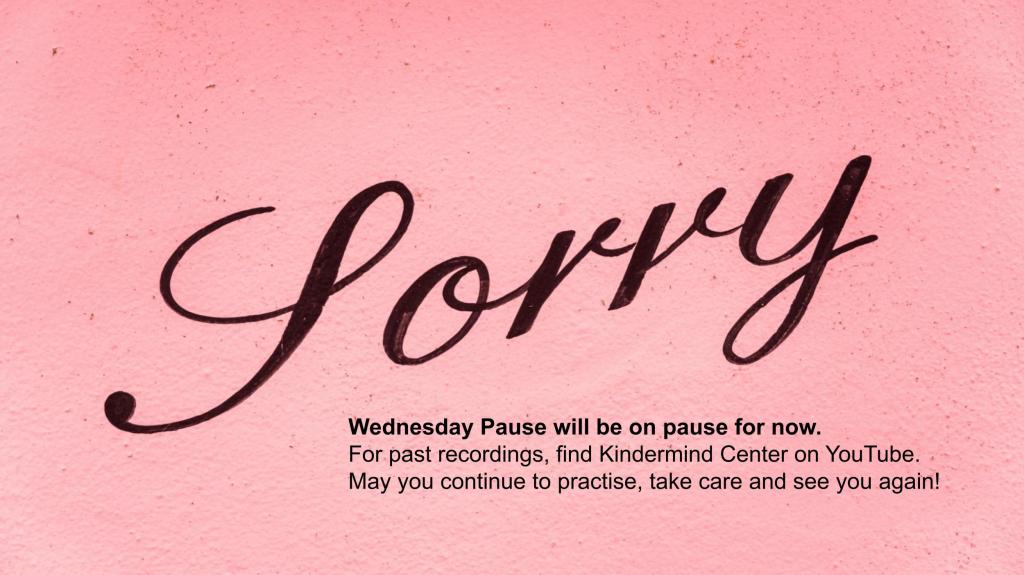
“Only from the heart can you touch the sky.” Rumi
“You are the sky. Everything else – it’s just the weather.” Pema Chödrön
Welcome to Kindermind Center (kaɪnder-maɪnd)!
A social purpose organization, Kindermind aims to promote kindness and resilience, and reduce vulnerability by offering accessible, evidence-based mindfulness training rooted in rigorous standards of teaching.
I teach the 8-Week MBCT (Mindfulness Based Cognitive Therapy) program as developed by Oxford Mindfulness Foundation in the UK, integrating mindfulness practices and cognitive therapy to address stress, burnout, low moods, depression, anxiety, and addiction. Originally for addressing depression, it benefits anyone aiming to cultivate mental wellbeing. Just like coding, happiness is a skill that can be learned and practiced.
What does it mean to practice mindfulness?
Mindfulness means coming into the “being” mode—consciously existing, to be in “the bloom of the present”, as Thoreau described it. It’s a shift from zombie-like autopilot or constant “driven-doing”, judging, fixing, controlling and avoiding. Signs of disconnecting include feeling overwhelmed, grasping, and escaping. If you recognize these signs within you, read on.
Our experiences are shaped by how and what we pay attention to—attention is the gateway. Practicing mindfulness, we intentionally shift from being lost in self-created stories to fully engaging with the present moment. This involves a curious, caring and befriending approach. By being open to the flow of our thoughts and feelings, we create the potential for healing and living each moment with ease rather than resistance and resentment.
When there’s congruence in our intentions, thoughts, physical body and actions, there is embodiment. We live with intentionality and presence.
As you are reading this, pausing for a moment, closing your eyes, and noticing how it feels when you are just acknowledging your breath and body. Just noticing.
Staying steady enhances focus and open-mindedness, fostering calmness, compassion, and resilience. Conversely, when the mind wanders into chaotic thoughts and reactivity, it leads to feelings of emptiness, dissatisfaction, craving, worry, leading us down a tunnel vision.
Why practice mindfulness? Who are invested in mindfulness?
Life is increasingly uncertain and complex—it easily throws us off-balance, leaving us vulnerable to symptoms like depression, now a leading illness, according to WHO (World Health Organization). And in the times that we live in, there may be anxiety from climate change, economic losses and political conflict.
Studies show the efficacy of mindfulness in dealing with a range of conditions such as depression, anxiety, and addiction, and in elevating compassionate leadership and productivity in workplaces. This is because mindfulness activates different parts of the brain, boosts neuroplasticity, and reduces the size of the amygdala (“reaction”, emotional center of the brain). Healthy workplaces reduces problems like staff turnover and absenteeism.
Emerging evidence also suggests that mindfulness could delay cognitive impairment such as dementia.
Increasingly, there are calls for introducing mindfulness to cultivate collective awareness and responses to social challenges such as society bias, and climate challenges, and to teach skills of compassion in the criminal justice system.
What’s the history of MBCT?
MBCT was developed by three academicians, Zindel Segal (Toronto), Mark Williams (now Oxford) and John Teasdale (Cambridge) in the 1990s to reduce depression relapses.
MBCT practices are adapted from Mindfulness Based Stress Reduction (MBSR) by Jon Kabat-Zinn, Professor Emeritus of Medicine at the University of Massachusetts Medical School. MBSR was introduced in the US healthcare system in the 1970s as a way to help patients respond to chronic pain.
The longevity of these programs is a testament of their integrity and standards of teaching.
MBCT adds cognitive therapy principles to appreciate how mental chatter, emotions and physical sensations compel us to act in a certain way. We also observe these inner experiences as just merely experiences and are transient. So we come to appreciate that we do not have to be a slave to our emotions, and can choose our response instead of rising to the bait of reactions.
Why choose MBCT?
MBCT is secular and therefore useful if you are seeking for a non-faith based approach to wellbeing. When you join this program, you are free to continue practicing your faith.
MBCT is backed by evidence, and approved by the National Health Service (NHS) in England as primary care treatment for depression, and potentially complements treatment of conditions like addiction, post-traumatic stress disorder (PTSD) and bipolar disorder. The UK National Institute for Health & Care Excellence (NICE) also recommends MBCT as an alternative primary care treatment.
MBCT teachers go through rigorous and supervised training and are obliged to observe good practice guidelines.
Why is MBCT also suitable for a non-clinical population?
The root of mental health challenges mirrors personal obstacles – our attachments and aversions, the insistence on things to be in a particular way, triggering impulsive reactions like impatience and avoidance. While they may bring temporary relief, and seem justifiable, the reactions and desires are the actual hindrances, not the original obstacle. MBCT helps us recognize these automatic tendencies and offers new ways to flourish and respond helpfully.
Life begins and ends with the mind and body. Join me on this journey of mindful growth!
Noelle Lim, Founder & Facilitator
Header image credit: Krista Mangulsone, Unsplash
